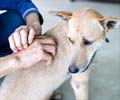Scientist has revealed that young, unsupervised children are most at risk for dog bites, usually from family pets and that if they bite once, they will bite again with the second attack

"We have seen facial fractures around the eye, eye lids torn off, injury to the tear drainage system and the eyeball itself," Durairaj said.
Some wounds are so severe that patients require multiple reconstructive surgeries.
Durairaj said dog bites are especially devastating to children because they are smaller and their faces are within easy reach of the animal's mouth. The likelihood of a child getting bitten in their lifetime is around 50 percent with 80 percent of those bites involving the head and neck.
The study of 537 children treated for facial dog bites found that 68 percent of bites occurred in children 5-years-old or younger with the highest incidence in 3-year-olds.
In the majority of cases, the child knew the dog through the family, a friend or a neighbor. And more than half the time, the dog was provoked when the child petted it too aggressively, startled or stepped on it.
Advertisement
The author presented his study last month at the American Academy of Ophthalmology's annual meeting.
Advertisement










